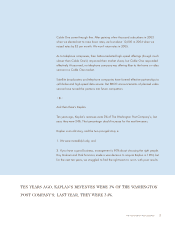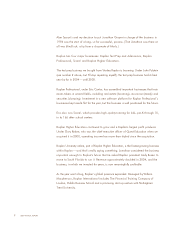Washington Post 2004 Annual Report Download - page 20
Download and view the complete annual report
Please find page 20 of the 2004 Washington Post annual report below. You can navigate through the pages in the report by either clicking on the pages listed below, or by using the keyword search tool below to find specific information within the annual report.
The following table sets forth certain information with respect to each of the Company's television stations:
Station Location and Expiration Total Commercial
Year Commercial National Expiration Date of Stations in DMA(b)
Operation Market Network Date of FCC Network
Commenced Ranking(a) AÇliation License Agreement Allocated Operating
WDIV 10th NBC Oct. 1, Dec. 31, VHF-4 VHF-4
Detroit, Mich. 2005 2011 UHF-6 UHF-5
1947
KPRC 11th NBC Aug. 1, Dec. 31, VHF-3 VHF-3
Houston, Tx. 2006 2011 UHF-11 UHF-11
1949
WPLG 17th ABC Feb. 1, Dec. 31, VHF-5 VHF-5
Miami, Fla. 2005(c) 2009 UHF-8 UHF-8
1961
WKMG 20th CBS Feb. 1, Apr. 6, VHF-3 VHF-3
Orlando, Fla. 2013 2015 UHF-11 UHF-10
1954
KSAT 37th ABC Aug. 1, Dec. 31, VHF-4 VHF-4
San Antonio, Tx. 2006 2009 UHF-6 UHF-6
1957
WJXT 52nd None Feb. 1, Ì VHF-2 VHF-2
Jacksonville, Fla. 2013 UHF-6 UHF-5
1947
(a) Source: 2004/2005 DMA Market Rankings, Nielsen Media Research, Fall 2004, based on television homes in DMA (see note (b) below).
(b) Designated Market Area (""DMA'') is a market designation of A.C. Nielsen which defines each television market exclusive of another, based on
measured viewing patterns. References to stations that are operating in each market are to stations that are broadcasting analog signals. However
most of the stations in these markets are also engaged in digital broadcasting using the FCC-assigned channels for DTV operations.
(c) The Company has filed a timely application to renew the FCC license of WPLG and such filing extends the effectiveness of the station's existing
license until the renewal application is acted upon.
Regulation of Broadcasting and Related Matters
The Company's television broadcasting operations are subject to the jurisdiction of the Federal Communications
Commission under the Communications Act of 1934, as amended. Under authority of such Act the FCC, among other
things, assigns frequency bands for broadcast and other uses; issues, revokes, modifies and renews broadcasting licenses
for particular frequencies; determines the location and power of stations and establishes areas to be served; regulates
equipment used by stations; and adopts and implements various regulations and policies that directly or indirectly affect the
ownership, operations and profitability of broadcasting stations.
Each of the Company's television stations holds an FCC license which is renewable upon application for an eight-year
period.
In 1996 the FCC formally approved technical standards for digital television (""DTV''). DTV is a flexible system that
permits broadcasters to utilize a single digital channel in various ways, including providing one channel of high-definition
television (""HDTV'') programming with greatly enhanced image and sound quality or several channels of lower-definition
television programming (""multicasting''), and also is capable of accommodating subscription video and data services.
Available compression technology also allows broadcasters to transmit simultaneously one channel of HDTV programming
and at least one channel of lower-definition programming. Broadcasters may offer a combination of services as long as
they transmit at least one stream of free video programming on the DTV channel. The FCC assigned to each existing full-
power television station (including each station owned by the Company) a second channel to implement DTV while
present television operations are continued on that station's analog channel. Although in some cases a station's DTV
channel may only permit operation over a smaller geographic service area than that available using its analog channel, the
FCC's stated goal in assigning channels was to provide stations with DTV service areas that are generally consistent with
their analog service areas. Under FCC rules and the Balanced Budget Act of 1997, if specified DTV household penetration
levels are met, station owners will be required to surrender one channel in 2006 and thereafter provide service solely in
the DTV format.
4THE WASHINGTON POST COMPANY
























